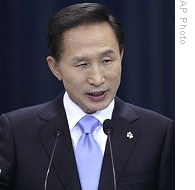VOA标准英语2008年-S. Korean President Apologizes, Promises US Bee
搜索关注在线英语听力室公众号:tingroom,领取免费英语资料大礼包。
(单词翻译)
By Kurt Achin
Seoul
19 June 2008
South Korea's president has made a second public apology for his management of a deal to resume controversial American beef imports. Responding to massive street protests, he says he will ensure age limits on the imports, in partnership1 with Washington. VOA Seoul Correspondent Kurt Achin has more.
 |
| Lee Myung-bak answers reporter's question after public statement regarding U.S. beef import deal at presidential Blue House in Seoul, 19 Jun 2008 |
For the second time in four weeks, South Korean President Lee Myung-bak apologized Thursday for failing to consider public opinion in a beef import deal with the United States.
This time, he added a key concession2 to protesters who have been pouring into the streets since April.
He says, as long as South Korean people do not want it, there will be no U.S. beef from cattle older than 30 months on offer to Korean consumers. Mr. Lee says he will obtain concrete guarantees from Washington on that point. He says he expects the United States, a close ally, to respect South Korea's will.
South Korea banned U.S. beef in 2003, after an American animal was found to have "mad cow disease." President Lee's April deal to resume U.S. beef imports angered South Korean opponents, because it failed to include the same sort of restriction3 on meat from older cattle that other U.S. trade partners maintain. Cattle older than 30 months are considered to be at higher risk of the disease.
There has never been a confirmed case of anyone contracting the human variant4 of mad cow disease from eating American beef. U.S. officials and the United National World Organization for Animal Health have said American beef is safe.
U.S. lawmakers have warned ratification5 of a much broader free trade deal, signed last year between the two countries, would be in jeopardy6 if South Korea did not reopen its beef market.
President Lee says the economic benefits of that agreement were uppermost in his mind when he made the beef deal.
He says he thought ratifying7 the free trade deal was a "shortcut8" to trigger the economic growth South Korea urgently needs. He says he thought ejecting U.S. beef would have endangered the deal and possibly set off trade disputes. So, like it or not, he says he thought the beef deal was unavoidable.
President Lee's trade minister is in Washington seeking concrete means of implementing9 the beef export limitation. The arrangement being discussed would be voluntary. However, Mr. Lee says President Bush has assured him the export limits would be guaranteed by the U.S. government.
Separately, President Lee promised to replace his chief of staff and other unspecified members of his cabinet, in the near future. He also promised to hold off on a massive South Korean canal project, if it is clear the people are against it.
 收听单词发音
收听单词发音 




